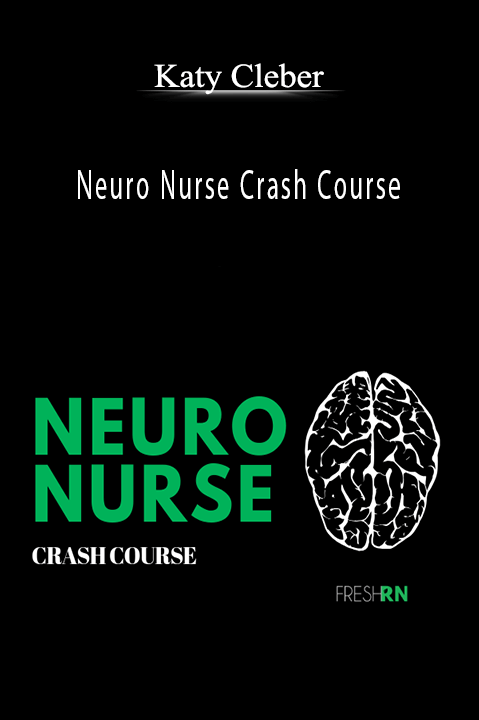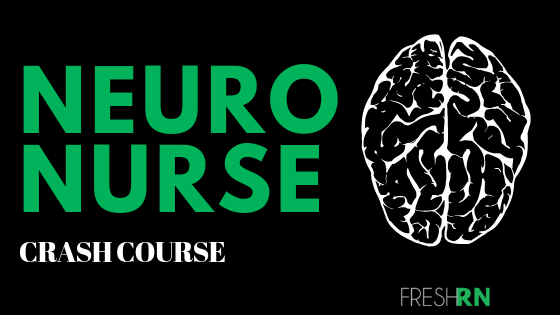Katy Cleber – Neuro Nurse Crash Course
Why is neuro nursing so intimidating?
Maybe it’s because when a neuro patient starts to decline, the signs are incredibly subtle.
Maybe it’s because truly understanding all that’s happening in the brain feels like a giant mystery and is too difficult to even begin to comprehend when you’re just trying to survive each shift.
Or, maybe it’s because neurosurgeons and neurologists are really intimidating and expect you to have the same level of understanding of neuroanatomy and disease processes they do – on day one.
What if it didn’t have to be that way?
What if you could take report on neuro patients, understand all of the abbreviations, and know exactly what your priorities needed to be for that patient?
What if you could quickly and efficiently complete a detailed neuro assessment, and be able to concisely communicate it to a neurosurgeon with ease?
What if you knew exactly how to explain really complex neuro pathophysiology to patients and loved ones in a way that made sense to them?
Learning how to be a confident and competent neuro nurse is tough. I’ve been a nurse since 2010 and had the honor of working in neurocritical care for a generous portion of my career. While today I am a nurse educator with a specialty certification in critical care, I didn’t start there.
I started out in neurocritical care back in 2012 incredibly intimidated and terrified. I was completely overwhelmed with learning how to care for critically ill patients – adding on their neurological issues was an entirely different obstacle I was not prepared for!
I was so scared that my patient’s neuro status would begin declining and I would be totally clueless. I was constantly worried I was missing something.
Whenever neurosurgeons and neurologists would round on my patients, I was so nervous they would ask me a question that would reveal how little I actually did know about neuro microanatomy and embarrass me in front of everyone.
With each shift, I would fumble through answering my patient’s and their loved ones questions, knowing I wasn’t making much sense but didn’t what else to say.
It was such a steep learning curve, but I made it through to the other side. Thanks to some amazing nurse educators sowing into my development, I was able to not only understand the why behind my actions but also learn how to become incredibly efficient at my time management and clear with my communication.
It was as if the nurse heavens parted and I saw the light!
Here’s the thing.
While the NCLEX® and nursing school did a great job of introducing neuro concepts and theory, there is so much more to know to safely care for neuro patients. It also prepares you for “perfect world” nursing, not the real world nursing you’re going to work in.
So what other neuro resources are out there?
There are text books, research articles, and professional nursing organization… but that information is far too technical. You need something to help you at the bedside now.
Nothing too broad, and nothing so detailed and highly technical that you can’t make sense of it. It’s crucial to break all of these really complex concepts down into terms that make sense for you – the bedside nurse new to neuro.
This is especially important because it will enable you to educate patients and loved ones better, while helping you know what to look out for in terms of complications and warning signs all while managing your time safely and efficiently.
And let’s be honest.
Being a nurse is tough. There is so much to know and it is constantly evolving.
This is especially true for newly licensed nurses.
While many of us know how to keep patients safe, a lot of us don’t know the why behind our actions for some time into our job. We are so focused on getting things done, staying caught up, and keeping patients safe that we don’t have time to ask specifically how mannitol reduce cerebral edema, why patients with a temporal lobe stroke have a high risk for seizure activity, or why the neurosurgeon always asks what the sodium level was.
We just give the mannitol… give the Keppra… and tell him or her the latest sodium level.
Only until we get into a groove can we even think about diving into the why behind things.
Sure, we passed a test or maybe even worked in another nursing unit, but just because we get hired into neuro and sit through some classes or pass some mandatory education tests doesn’t mean we get it. There’s so much pressure in those classes to say the right thing so can make sure you save face.
But… what if we didn’t have to wait until months after beginning our orientation to really get our minds around important information?
What if you could start your neuro job with a practical knowledge of neuro anatomy and disease processes so you could focus on learning the intricacies of your unit?
What if you had access to a resource to answer all of those questions that you could work through at your own pace?
What if you could learn about the must-know information to take care of neuro patients at home so you could look like a neuro rock star on the unit?
Introducing the Neuro Nurse Crash Course from FreshRN®
The online course for motivated nurses new to neuro who desire straight-forward and practical education they can apply at their very next shift on a neuro floor or neurocritical care unit
With the FreshRN® Neuro Nurse Crash Course, you’ll learn:
- How to perform a flawless neuro assessment on both conscious and unconscious neurologically compromised patients – with video examples! [Neuro Assessments section]
- The difference between primary and secondary injury, how to detect neurological decline, and how to communicate it in an educated and concise manner to neurologists, neurosurgeons, neurointensivists, and advanced practice providers [Communicating Assessment Findings module, Primary and Secondary Injuries section]
- The most common neuro disease processes like ischemic and hemorrhagic strokes, subdural and epidural hematomas, subarachnoid hemorrhages, intraventricular hemorrhages, hydrocephalus, seizures, and tumors broken down so that you can truly understand them – and educate others [Brain Injuries module]
- What is really happening with brain death testing and organ procurement, and your role as the primary nurse [Organ Donation and Procurement modules]
- Why it is imperative to know your neuro patient’s sodium levels and how to safely correct them [It’s All About the Salt section]
- What to expect from your orientation into a neuro nursing unit and how to optimize it so you can begin to work as autonomously as quickly as possible [Neuro Orientation module]
- How to receive nursing report like a pro, know what questions to ask, and what red flags to watch out for [Neuro Report modules]
- How to give a flawless neuro nursing report and sound like a highly experienced neuro nurse [Neuro Report modules]
- How to detect subtle neuro changes, communicate them to providers, and document accurately [Communicating Assessment Findings module, Documenting Assessment Findings module, Noticing Subtle Neuro Changes module]
- How to manage your time and get things done in a busy neuro nursing unit [Time Management modules]
- The must-know information on top neuro meds, explained in plain English [Medications module]
Instant Access Available
Downloadable Content
Get Instant Download Katy Cleber – Neuro Nurse Crash Course at Offimc.click Now!
Delivery Information
- Upon ordering the product, a delivery email with download instructions will be sent immediately to you so that you may download your files. If you log in (or create an account) prior to purchase you will also be able to access your downloads from your account dashboard.
- It is a digital download, so please download the order items and save them to your hard drive. In case the link is broken for any reason, please contact us and we will resend the new download link to you.
- If you don't receive the download link, please don’t worry about that. We will update and notify you as soon as possible from 8:00 AM – 8:00 PM (UTC+8).
- Please Contact Us if there are any further questions or concerns you may have. We are always happy to assist!








10 reviews for Neuro Nurse Crash Course – Katy Cleber
There are no reviews yet.